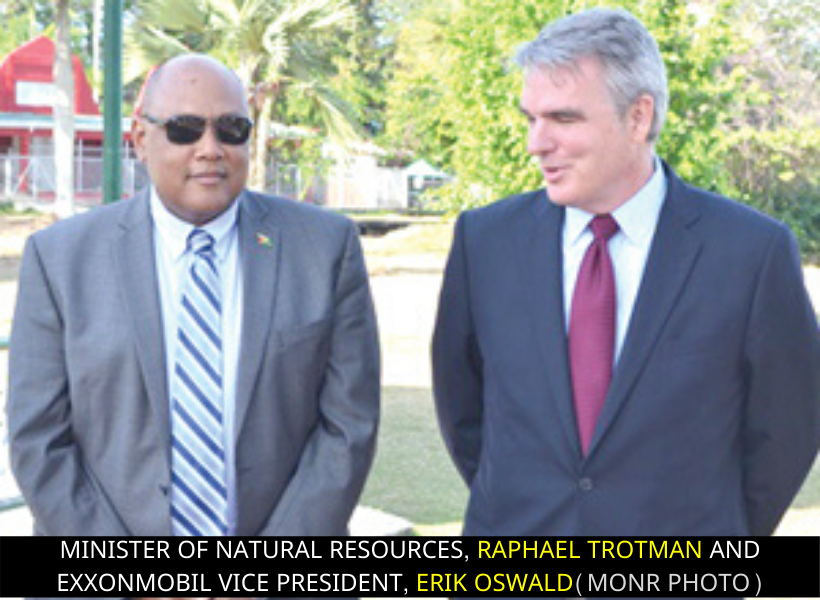By Abena Rockcliffe-Campbell
From all indications, he did not represent the interest of his country which was supposed to be his only concern as an elected representative of the people of Guyana. That is why the Global Witness has recommended that the Government of Guyana cause a full investigation to be launched into the affairs of Minister of Natural Resources, Raphael Trotman during negotiations for the 2016 contract he signed with ExxonMobil.
For the benefit of those unfamiliar, Global Witness is an international NGO established in 1993 that works to break the links between natural resource exploitation, conflict, poverty, corruption, and human rights abuses worldwide.
Taking a look into Guyana’s current ties to ExxonMobil, Global Witness found, among other things, that:
· Trotman enjoyed a trip described as a “glamorous affair” paid for in full by Exxon
· He was privy to information indicating just how much value Guyana brought to the table
· He knew that Exxon was desperate and had the weaker hand
· He Operated under a “possible conflict of interest”
· And Ignored experts’ advice not to sign the contract without further information
Describing it as “a story about how an aggressive company negotiated an exploitative deal with a minister who may not have been working in Guyana’s best interests”, Global Witness spoke about how Guyana was shafted in a deal that could have easily gone otherwise.
In a report released today, Global Witness noted that in April 2016, Exxon found that its Guyanese license would soon expire, putting in jeopardy the company’s increasingly valuable asset. “Exxon needed a new deal, and it aggressively pursued one.”
Global Witness said that Exxon opened negotiations in Texas by confronting two inexperienced Guyanese officials with a new draft license to be signed within ten weeks.
“Exxon did not want to change the favorable financial terms from its 1999 license, despite having recently found significant oil reservoirs that would customarily allow the government to ask for more,” the report stated.
“Enter Raphael Trotman, Guyana’s Natural Resources Minister, who later that month stepped out of a limousine into the sunny spring heat outside Exxon’s Texas headquarters.” Global Witness said, “The trip was a glamorous affair.”
“Trotman and two other Guyanese ministers were meeting with Exxon on a ‘ministerial visit.’ He had flown first class, was staying at a pricey hotel nearby and would dine at Exxon’s exclusive Wolfgang Puck restaurant – all on the company’s dime. But despite Exxon’s demands earlier in the month, Trotman – responsible for signing Guyana’s oil licenses – did not appear to spend his time in Texas negotiating. According to a memo summarizing his trip, the minister instead toured Exxon’s new glass and steel offices,” Global Witness stated.
The international observer was keen to note that Trotman and his team were most impressed by the company’s facilities for keeping Guyana’s oil find samples: Trotman wrote, “What was most striking was the very strong smell of oil that filled the room.”
Global Witness said that although a new Stabroek deal does not appear to have been discussed by Trotman during his April Houston trip, by June 2016 the minister was very much engaged in negotiations. He would not, however, serve as a strong advocate for his country.
Trotman was told by two experts that the government needed more information about the economics of Stabroek before signing; the second expert he consulted even suggested where Guyana could get money to hire advisors.
Both sets of recommendations were apparently dismissed.
In December 2019, Global Witness asked Trotman why he apparently ignored expert advice and Guyana’s strong negotiating position during negotiations with Exxon. The minister did not respond to Global Witness’ letter.
The report states that there is also evidence that Trotman was aware Guyana was negotiating from a position of strength but failed to capitalize upon Exxon’s weak hand. First, according to evidence seen by Global Witness, Trotman was aware that Exxon was eager to get a new deal. The company was worried about its license expiring.
Second, Trotman knew Exxon would soon announce the results of its newest exploration well – Liza 2 – informing Guyana just how valuable Stabroek would be.
Global Witness said that it does not have evidence that Trotman was unduly influenced by his lavish Exxon meeting. But there is evidence that he negotiated badly for Guyana, one of the poorest countries in the Western Hemisphere.
And, according to an OpenOil analysis commissioned by Global Witness, the deal Trotman obtained is an exceptionally bad one. OpenOil estimates that Guyana stands to lose up to US$55 billion under Exxon’s Stabroek deal.
Global Witness also said that Trotman may have been operating under a possible conflict of interest in the form of his partnership with Exxon’s lawyer Nigel Hughes
Global Witness said that Guyana’s government should investigate the process by which the Stabroek license was negotiated. This should include a review of whether an apparent conflict of interest prevented Raphael Trotman from fully negotiating in the best interests of the country.
Global Witness also said, “If it is determined that he or others did not represent Guyana well during these negotiations, or there is other evidence of wrongdoing or incompetence, those involved should be held accountable.”













